What To Eat And What Not To Eat In IBS
Are you troubled with abdominal pain, diarrhea alternating with constipation, belly cramps, or bloating? Irritable Bowel Syndrome (IBS) might be the reason behind this discomfort. IBS can have long lasting problems, hence managing it well is important.
According to a study published by U.S. National Institute of Health, making certain dietary modification may help sabotage the symptoms of IBS. Learn here in detail about foods to eat and not to eat in IBS.
What to Eat in IBS?
Some food options for an IBS patients include the following:
Boost your fiber intake
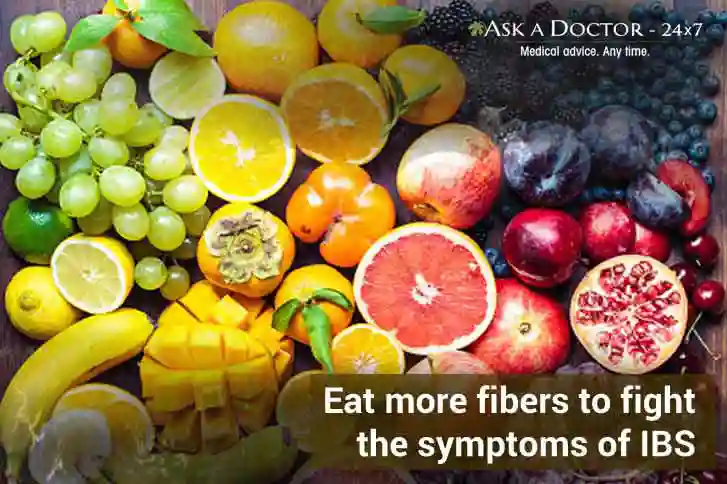
Always consider increasing your daily intake of fiber slowly, by 2 to 3 grams
per day until it reaches 25 grams/day for women and 38 grams/day for
men. Because including too much fiber at once in your diet can cause gas and may trigger IBS symptoms.
Also,
if you suffer from diarrhea consider having soluble fibers, while
those who suffer from constipation should opt for insoluble fibers. Here is the list of food items that are rich in soluble and insoluble fibers:
- Soluble fibers are found in oranges, strawberries, blueberries, cucumbers and carrots.
- Insoluble fibers includes zucchini, broccoli, cabbage, grapes, and root vegetables.
Eat healthy protein and low-FODMAP foods
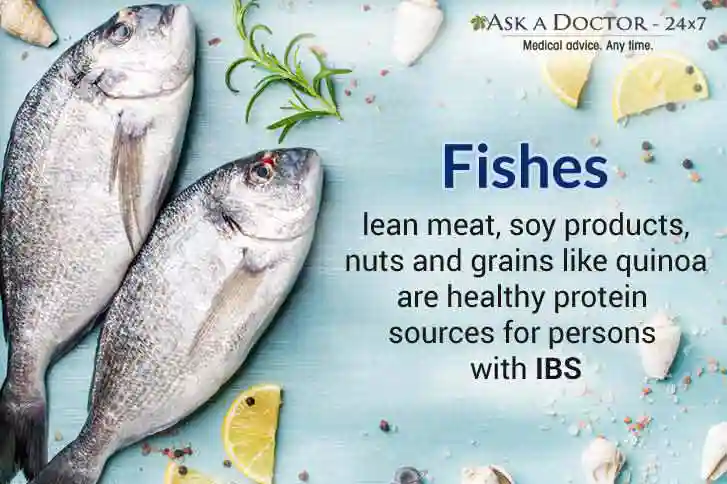
Fishes,
lean meat, and turkey some of the healthy protein sources, which is
easier to digest. Prepare them by grilling, steaming or baking with
little or no oil.
Vegetarians should opt for soy products such as
soybeans, soy milk, grains like quinoa, and nuts and seeds like almonds,
walnuts, chia seeds, poppy seeds and pumpkin seeds. These are low-FODMAP (Fermentable, Oligosaccharide, Disaccharide, Monosaccharide, And Polyols) and healthy protein-rich foods, which is considered best diet for IBS.
What Not To Eat In IBS?
Here's a list of foods that you need to 'avoid' when you’'e suffering from IBS:
Avoid fruits with high fructose content and cruciferous vegetables
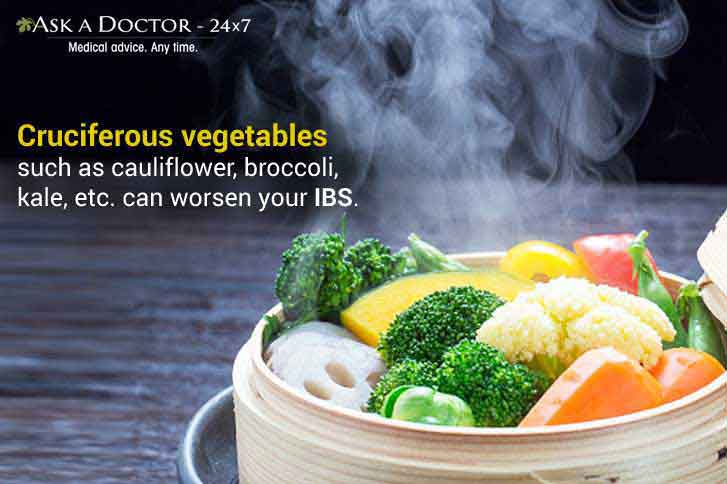
Certain vegetables such as broccoli, cauliflower, and brussels sprouts, onions, leeks, and asparagus cause gas and abnormal bowel movements. Similarly, high fructose content fruits such as apples, pears, and watermelon can worsen the symptoms of IBS. Hence, any one suffering from an IBS condition should avoid these fruits and veggies.
Go for fruits that are lower in fructose, such as banana, blueberry, boysenberry, cantaloupe, cranberry, grape, orange, lemon, lime, kiwi and strawberry for better alternatives.
Say no to caffeine
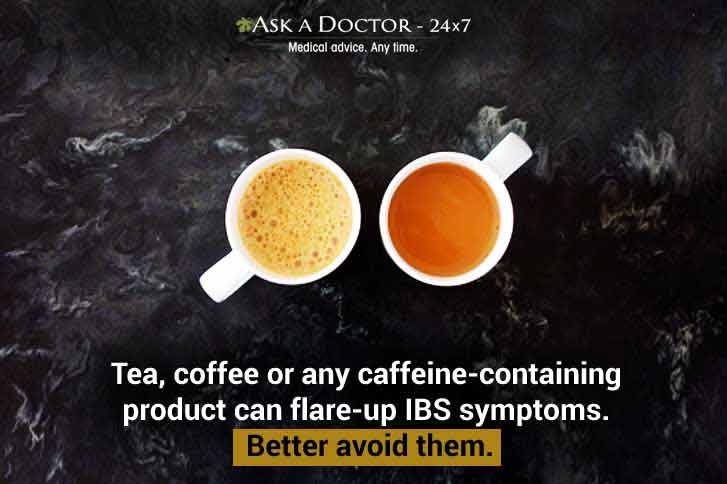
Caffeine triggers the symptoms of IBS such as diarrhea, gas, or bloating, hence caffeine rich drinks such as coffee, tea, and soda should be avoided.
Better go for juices made from cranberries, bananas, grapefruits, lemons, grapes, and pineapples. Or sip on herbal tea such as lemon honey tea, chamomile tea, or mint tea to satiate your tea-yearning taste buds.
Restrict intake of dairy products
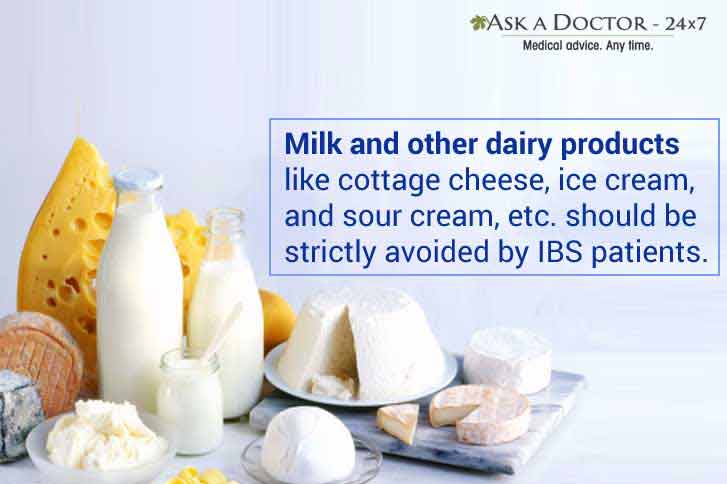
IBS patients usually suffer from lactose intolerance. Hence, dairy products such as milk, cheese, cottage cheese, ice cream, butter must be restricted in the diet of IBS patients.
Consider oat milk, rice milk, or soy milk as good alternatives to cow’s milk. Use olive oil in place of butter.
Making a stepwise changes in your lifestyle — with a low-fat diet, exercise, and avoidance of alcohol and cigarette smoking — will certainly bring a great relief from the IBS. However, for people who still need help, IBS is treated with some anti-cholinergic medicines and antidepressants.
For any query related to inflammatory bowel syndrome, you can consult a Gastroenterologist at www.healthcaremagic.com


Ask a Specialist
Q - What are the white stripes going through my leg?
A - Thanks for posting the query The image of the lines might be due to any extra fixator or a dressing done. Are u on any treatment for the leg issue applying any cast? Please do reply Take care....
Q - I have question on sexual issues
A - Hi, Welcome to ASK A DOCTOR through HCM, Thanks for posting your query. Furnish in detail about your problem. Let us try to solve. Anyhow sex problems need close interactions Just prescriptions alo...
Q - Can you suggest holistic treatment plan to restore ejaculatory control?
A - Hi, Thanks for posting your query. Whether you are married or unmarried individual? Early ejaculations in a young adult is a good sign. Not to get upset for the same. Really it indicates your vi...
Q - What if my mouth touched my upper part of my shirt?
A - Touching your unwashed shirt with your mouth can definitely expose you to some infections, particularly, if not washed for a long time. Exfoliated dead skin cells, sweat or some oth...
Q - Can you please help me read the report and advise on medication?
A - Hi, Thanks for your query I would like to know some more details before analysing your report When was your last period? Are you on any medication ? Do you have kids ? Do you have any disturbanc...
Q - What is the line of treatment and is their chances for improvement?
A - Hi , i am dr diwashish biswas. welcome to ask a doctor service. The CT scan shows signs of an old stroke (infarct) in the left basal ganglia and age-related brain shrinkage (atrophy), which are com...
Q - Is the sunscreen fine to buy or you recommend any other?
A - Hello. All the depiwhite are same only packaging is different. You can use any of these. Apply a small quantity and gently rub for 30 seconds under your eyes in night. In morning apply sunscreen all ...
Q - Is there any leftover radiation?
A - Hey thanks for the question. There is no harm once CT is done and eye glasses offer extra protection so dont worry . Hope my answe helped you....
Q - Why feeling irritated getting angry at petty things and strong chest pain at that time?
A - Hi, This is Dr Sameer Maheshwari, I am a cardiologist based in Considering the pain doesn’t always increase on exertion, it should not be related to heart. As the ECG and Echo are already done ...
Q - I am feeling slight pain under my left arm near the armpits.
A - Hi , This is Dr Sameer Maheshwari, I am a cardiologist based in Can you please answer some questions first - Does the pain increases or decreases upon exertion (walking or running) Is the pain ...
Respiratory Health Eye Health Stress Relationship Sex Healthy Food Bone Health Vitamins & Minerals Cancer Hypertension Heart Health Nutrition Weight Loss Fatigue Alcohol Sleep Addiction Fitness Home Remedies Skin Acne Mental Health Depression Herbal Drink Women Health Diabetes Joint Pain STD Obesity Kids Health Cold & Flu Pain Hair Yoga & Meditation Kidney Health Oral Health Essential Oil Liver Health Hearing Issues Health Accident & Emergency Men Health Ayurveda Thyroid Infection Lung Health Immunity Headache Kids And Adolescent Seasonal Conditions Respiratory Health Cold & Flu Herbal Drink Pregnancy Yoga Diet Cold Kids Lungs Diabetes Sex & Relationship Women's Health Brain Health Inflammations Immune Health Skin Health Infections Mens Health Skincare
166 answers / hour
Quick doctor answers
18,000+ doctors
Join the doctor network
1.6 Million+ answers
Across 74+ specialties